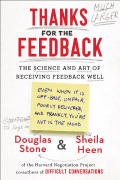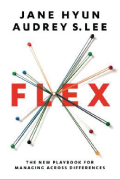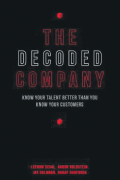TD Magazine Article
Feedback Hijacks
A review of Thanks for the Feedback: The Science and Art of Receiving Feedback Well by Douglas Stone and Sheila Heen
Sat Mar 08 2014

Thanks for the Feedback: The Science and Art of Receiving Feedback Well
By Douglas Stone and Sheila Heen
Viking Adult, 368 pp., $20.39
Effective feedback is critical for developing and sustaining high-performing employees. So why leave the success of these high-stakes interactions in the hands of those providing the feedback?
Thanks for the Feedback takes a 180-degree turn in the usual approach to feedback. Instead of teaching readers to deliver it effectively, Stone and Heen show them how to receive it in a way that builds self-awareness and action planning for improvement.
Each of us receives feedback constantly, whether it is offered formally, informally, or even unintentionally. The authors explain how these exchanges are at a critical junction of conflicting human desires—to learn how we can improve and to be accepted as we are.
Interpersonal relationships often are much more complicated than the content of the feedback dialogue itself. Recipients often allow external circumstances or their relationship with the person providing the feedback to influence how they will act on it. To help employees ward off internal biases and receive feedback objectively, Stone and Heen identify three types of feedback triggers—ways in which we "hijack" the feedback received from others—and how to watch out for and temper those reactions.
For example, so-called "truth triggers" engage our internal error-detection circuits and build our anxiety as we try to find something in the content of the feedback that we can internally falsify ("that's not exactly true, therefore the whole measure of this feedback must be wrong"). "Relationship triggers" are pulled when feedback is viewed through a lens distorted by the relationship between the giver and receiver, and "identity triggers" are set off when we hear how others view us, and it is in stark contrast to our own opinions of ourselves. These are important triggers to recognize because without them, we cannot learn to accept feedback gracefully and interpret it constructively.
Stone and Heen describe in a meaningful way what is entirely true about the feedback process: It's a complex interchange that is inevitably influenced by the perceptions and biases of the giver and receiver. An excellent follow-up to their bestselling book Difficult Conversations, Thanks for the Feedback provides a powerful framework for making feedback work—no matter what it is or how it is given.
Flex: The New Playbook for Managing Across Differences

Jane Hyun and Audrey S. Lee
HarperBusiness, 336 pp., $28
The skills gap isn't the only gap managers have to worry about. According to the authors of Flex, there's also a widening "power gap" between managers and the increasingly young, female, and multicultural workforce they have in their command. However, with the right skills and knowledge, managers can effectively lead employees of different cultures, generations, and gender. From authors who have advised Fortune 500 companies on global leadership skills, this book shows managers how to leverage the diversity on their teams with intelligence and grace, and improve retention, engagement, collaboration, and results.
The Decoded Company: Know Your Talent Better Than You Know Your Customers

Leerom Segal, Aaron Goldstein, Jay Goldman, and Rahaf Harfoush
Penguin, 326 pp., $27.95
Talent analytics is a branch of big data that is destined to be a hot topic in 2014. Many companies capture and interpret data that help them understand the needs and expectations of their customers, but few do it to understand what really makes their businesses tick—their employees. The Decoded Company shows how organizations can create data-driven cultures that unlock employees' full potential, which increases engagement, retention, and profit. Filled with insightful examples and thoroughly action-oriented, this book makes talent analytics accessible for every company.
The New Corporate Facts of Life: Rethink Your Business to Transform Today's Challenges Into Tomorrow's Profits

Diana Rivenburgh
AMACOM, 244 pp., $27.95
We all know that the global business environment is changing, technology is evolving, we must be agile and social, and so on. But sometimes we may think, "A bulleted list of what's changing and how it affects my company, and some action items on how to deal with these changes would be nice." This is exactly what Rivenburgh presents to readers. Her book is for those who are uncomfortably aware that their companies are not on the cutting edge, but aren't quite sure how to get there.
What's on Lisa Bodell's Bookshelf?
Give and Take: A Revolutionary Approach to Success by Adam Grant. It's a great book on the psychology that can drive good business.
Let's Explore Diabetes with Owls by David Sedaris. I enjoy this because it's just hilarious to read. It's a great plane-reading book.
The Social Animal: The Hidden Sources of Love, Character, and Achievement by David Brooks. This is a great story woven with facts about human nature.
